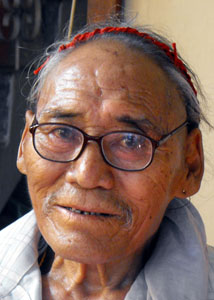Name: Dukha
(Alias: No)
Gender: Male
Interview Age: 84
Date of Birth: 1926
Birthplace: Shungru, Utsang, Tibet
Year Left Tibet: 1959
Profession: Nomad
Monk/Nun: No
Political Prisoner: No

Interview No.: 48M
Date: 2010-04-05
Language: Tibetan
Location: Doeguling Settlement, Mundgod, Karnataka, India
Categories: Culture and History
Keywords: Chinese -- first appearance of, Chinese army -- invasion by , escape experiences, government/administration, nomadic life, refugee in India -- life as, salt trade, taxes, trade, Utsang
Summary:
Dukha hails from Shungru village which consists of about 50 families. They were nomads and reared sheep and yaks. He talks about the system of khathak in which 10 families were entrusted with 200 animals each by the government. Certain families faced hardship due to their inability to pay taxes in the form of butter and cheese meant for the Monlam Prayer Festival in Lhasa. Besides dairying, the people of Dukha's village also gathered salt and exchanged it for grains.
Dukha gives details of the working of the justice system in his village: the powers and responsibilities of the district administrator and the types of punishment awarded to offenders. Another unique custom he recounts is that of not allowing animals and women to enter pilgrimage places in his village.
Dukha remembers that the Chinese first appeared in 1945-46, but they were killed in a nearby region and it is believed this kept the Chinese from returning until they once again appeared in 1959. He narrates how the influential people of his region were killed or imprisoned. After escaping he worked on a road crew for two years and arrived in Dharamsala in 1961. He describes the conditions when he first arrived in Mundgod.
Interview Team:
- Rebecca Novick (Interviewer)
- Ronny Novick (Videographer)
- Namgyal Tsering (Interpreter)

